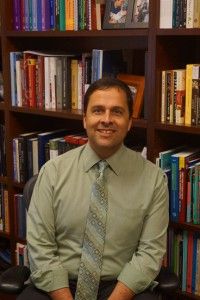Self-esteem and self-worth have been topics of discussion among psychologists for many years, but for Pepperdine professor Dr. Steve Rouse they are topics of his long-term research and a published journal article. His article, titled “Universal Worth: Construct and Scale Development,” was published in the Journal of Personality Assessment on Dec. 16, 2011, and served as the first step to follow-up research.
“I wanted to find some forms of self-worth that are desirable,” Rouse said, “I came to the belief that one desirable form of self-worth is the belief that God values all people, and not just yourself, equally and without regards to successes and failures, without regards to virtuous behavior or sinful behavior. God equally values everyone. That’s the basis of what I am calling the Universal Worth.”
Rouse said he believes that “among religious individuals the healthiest view is the one that God loves all people. “
The research shows that there are different types of self-worth and self-esteem that lead people to aggressive behavior and selfish behavior. An example of a type of self-esteem that tends to lead to negative behaviors is narcissism.
“A narcissistic person believes that he is entitled to the best of everything,” Rouse said. “They are superior to others. They always act in an aggressive or prejudicial kind of way. There are other forms of self-worth or self-esteem that are pre-judgmental.”

The major idea is identification of the types of self-esteem and the types of self-worth that lead to positive behaviors.
The published article deals with developing a foundation of research. Rouse used the standard scientific method, believing that it is the most appropriate one for the psychological and religious study.
The first step toward the research was finding ways to measure characteristics in order to create the test.
“It is impossible to have good research without having a solid way of measuring the characteristics.” Rouse said. “I outlined the theory of universal worth and I outlined the test to measure its scale.”
Overall, the research took two years, mostly because it involved four separate studies.
“That’s the longest I have ever worked on any article,” Rouse said, “I wanted to be sure that the study was as strong as possible because my future research will be based on it. If I took shortcuts on this first step, it would end up hurting me in future. I wanted to make sure it is as effective as possible.”
“Now I am involved in series of follow-up studies to examine whether or not this form of self-worth, this belief is associated with this kinds of behaviors,” Rouse said.
Despite the fact that the topic is very unique and out of the ordinary, Rouse faced some obstacles while doing the research and trying to get it published.
“A lot of people in psychological research have a belief that you can’t scientifically study religion or religious-themed ideas, and I did run into some resistance both at the journal article and also at some presentations among people who were concerned that you can not scientifically study religion,” Rouse said.
In the past, Rouse has published additional articles; however, driven by the desire to relate his research to something that can be applied to the everyday life, he chose to dedicate the past three years on working on the topic of self-worth.
“My previous works were not connected much to life,” Rouse said, “I am very proud of those works that I have done during my previous years working at Pepperdine. It was high-quality research. But it did not help people.”
Rouse is currently working on a series of studies to develop a broader spectrum of his research, focusing on monotheistic religions. He is planning to develop the larger hypothesis that a group of people who believe in a universally loving God are more likely to help others and more likely to be altruistic and pro-social than religious individuals who believe that God favors some people more then the others, or believe that God loves people less when they violate principles or religious laws.
“The Journal of Personal Assessment is very well-respected journal among main-stream psychologists, so I wanted to have it published in that kind of journal to be able to show that it was not just a fluffy concept,” Rouse said.
Even though most researchers in psychology do not write books, rather journal articles, Rouse does not exclude the possibility of turning his research into something bigger.
“If my hypothesis is right, if it is true that religious people are more likely to act pro-socially, then I do think I might write a popular press book targeted for general audience, non-psychologists. But before I can do it, I need to make sure I have a good foundation for it.”
